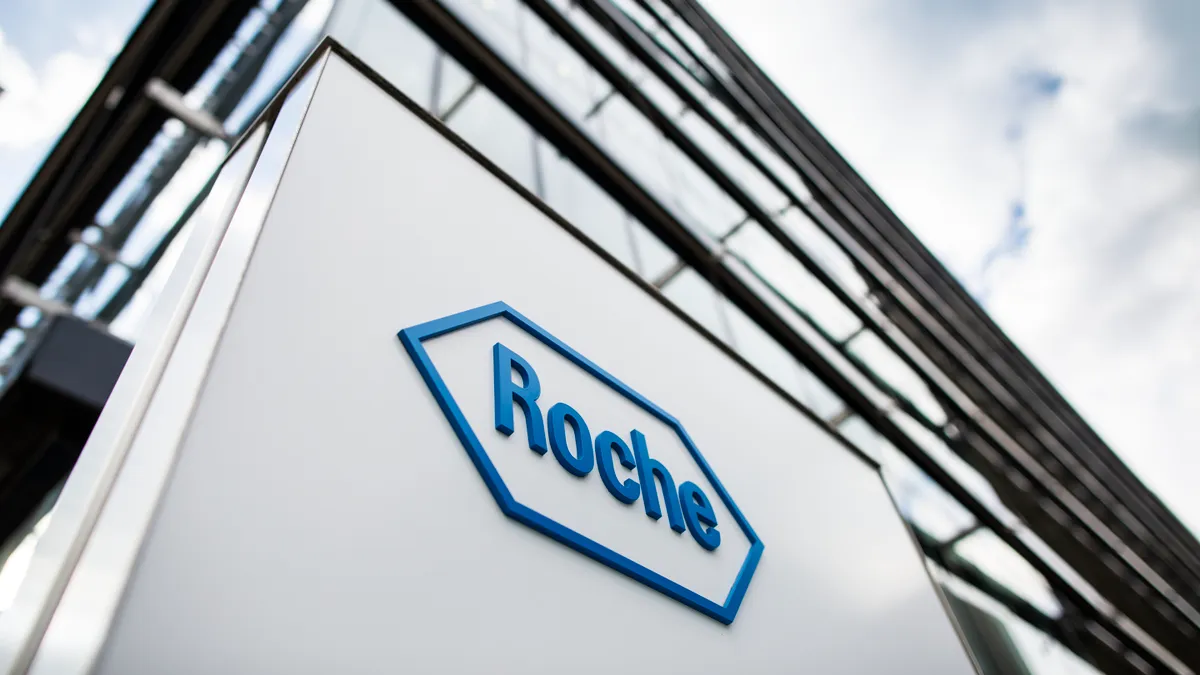Dive Brief:
-
Roche is set to start selling an instrument-free COVID-19 antigen test in Europe later this month and seek emergency use authorization from FDA.
-
The test, which Roche discussed in a statement Tuesday, is similar to the Abbott kit that won an EUA last week. Both kits test for SARS-CoV-2 in 15 minutes without the use of instruments essential to antigen products sold by competitors BD and Quidel.
-
Roche expects to be making 40 million of the SARS-CoV-2 Rapid Tests per month when it launches in late September and more than double that figure by the end of the year. If Roche hits those targets, it will add significantly to global antigen testing capacity.
Dive Insight:
Quidel received an EUA for its Sofia SARS Antigen FIA test back in May and, along with fellow early market entrant BD, went on to negotiate contracts to supply millions of tests to U.S. nursing homes and some states. The market has changed quickly in recent weeks, though, with the EUA for Abbott's antigen test offering an option that forgoes the need for instruments, reducing costs and increasing capacity.
Now, Roche is set to accelerate the changes sparked by Abbott. Working with SD Biosensor, Roche is poised to introduce a test that appears similar to the Abbott product in countries that accept CE marks and seek the EUA it will need to sell the diagnostic in the U.S.
Roche is yet to disclose the price of its test, unlike Abbott which is charging $5 a kit, but has shared other key numbers. A study of 426 samples run at two independent centers found Roche's test has a sensitivity of 96.5% and specificity of 99.7%. The figures are close to data on Abbott's test, which received an EUA after achieving sensitivity of 97.1% and specificity of 98.5% in a study.
The performance of the Abbott and Roche tests, coupled to data on instrument-based tests sold by LumiraDx and Quidel, has diminished concerns about the accuracy of antigen kits. Those concerns were underpinned by early data on antigen tests. The sensitivity of BD's test is 84%.
In July, Thomas Schinecker, the CEO of Roche Diagnostics, told investors the company's efforts to develop an antigen test had yielded "basically" the same accuracy as the 80% to 84% sensitivity of the first kits to come to market. At that sensitivity, Schinecker downplayed the value of using antigen tests to screen asymptomatic populations. Six weeks later, Roche has a claimed sensitivity of 96.5%.
Abbott and Roche have also reset expectations about testing capacity. While BD and Quidel are striving to make up to 15 million tests between them, Abbott entered the market with capacity to produce "tens of millions" of kits and plans to scale up to a 50 million run rate by October.
At launch, Roche will be making 40 million tests a month. Roche plans to increase monthly output to more than 80 million by the end of the year. By those calculations, if Abbott and Roche hit their production targets, global antigen testing capacity could increase roughly 10-fold in a matter of months.
The additional rapid point-of-care testing capacity could help countries protect nursing homes and safely reopen workplaces, schools and universities. In the U.S., the Trump administration is sending most of the 150 million antigen tests it bought from Abbott to states for distribution. Roche is yet to disclose any deals for its antigen test.










